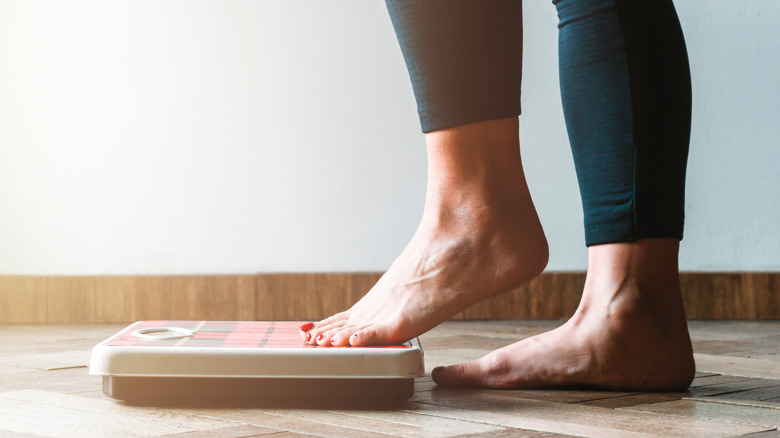Reasons You Should Stop Weighing Yourself Regularly
Despite a recent push toward body positivity, we still exist within a culture that disproportionately values thin bodies. Psychotherapist Kathy Kater told ABC News that many people believe that how they look matters more to others than who they are, and that thinness is the key to the so-called perfect body.
This isn't a particularly new concept. With the industrial revolution introducing standardized sizing, advances in food science familiarizing us with the meaning of a calorie, and the scale becoming commonplace in the home, by the 1920s most American women found that, in one way or another, diet culture was creeping into their everyday lives (per Live Science).
Over a hundred years of societal pressure has fostered a rather unhealthy relationship between many modern people and their scales. While a 2018 study published in Circulation found that people who weighed themselves daily lost more weight than those who weighed in once a week or less, a 2015 review published in Current Obesity Reports examined the results of 20 articles and found that overall, daily weigh-ins had a negative impact on participants mood, self-esteem, body evaluation, and eating behaviors.
As many of us seek to incorporate more body positivity into our own lives, some self-reflection may be required in order to evaluate what is working for us and what is working against us. For many of us that may mean breaking up with the scale. Here are a few good reasons to stop weighing yourself every day.
The downsides to self weighing
If you're weighing yourself regularly, Insider reports that you may be missing important cues from your body in favor of catering to your scale. People often ignore signs of hunger and exhaustion when they are overly attached to a number on the scale. This leads to the unhealthy pattern of eating as a reward when we've lost weight and restricting food when we've gained a couple of pounds. What's more, our weight can vary up to five pounds per day, making daily weigh-ins fairly unreliable (per Livestrong). And because the scale can't differentiate between a pound of muscle and a pound of fat, the number on the scale isn't necessarily reflective of your body composition.
Daily weigh-ins can also lead to fixation, especially in people who have an inclination toward disordered eating (per Washington Post). Clinical psychologist Mallory Frayn explains that if you restrict calories, purge, or take laxatives as a knee-jerk response to weight gain and the next day your weight drops by a pound or two, it can reinforce an unhealthy behavior. In fact, a 2016 study published in the International Journal of Eating Disorders found that people with anorexia and bulimia nervosa who weighed themselves daily experienced greater pathology.
Healthline suggests that the best practice for self-weighing is to weigh yourself one morning a week, always under the same conditions. If at any point you feel like weighing yourself is negatively affecting your self-esteem, give yourself permission to toss the scale.


